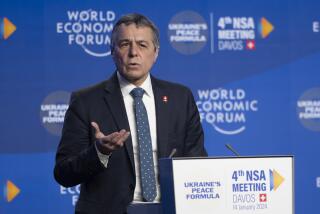Soviet Negotiator Vows Constructive Arms Talks
- Share via
GENEVA — In a low-key statement on his arrival here Sunday, Viktor P. Karpov, chief of the Soviet arms control delegation, said that he will “negotiate in a businesslike and constructive manner” in the new round of talks with the United States opening Tuesday.
“The negotiation affords an opportunity for productive work and reaching solutions aimed at preventing an arms race in space and terminating it on Earth after limiting and reducing nuclear arms and strengthening stability,” Karpov said. “Agreement on implementation of far-reaching measures in these areas would be an important step toward obtaining a truly historic goal--that of ultimately eliminating nuclear arms completely and everywhere.”
Both sides are thus using the same language publicly, at least for propaganda purposes, to describe the goal of nuclear weapons elimination. But six years have elapsed since the United States and the Soviet Union last signed an arms control agreement, and even the most optimistic observers expect little agreement in Geneva for many months to come.
Karpov, 56, a big, hearty man with an outwardly jovial manner, speaks fluent English and has been involved in nuclear talks with the United States since the original strategic arms limitation talks that opened in Helsinki, Finland, in 1969. The two other Soviet team leaders are Alexei A. Obukhov, 47, and Yuli A. Kvitsinsky, 48.
Three armed guards with machine guns stood by as Karpov, flanked by Obukhov and Kvitsinsky, spoke.
In Moscow, the major government and Communist Party publications continued Sunday to press the Kremlin position that no success in Geneva is possible unless weapons in space are outlawed, a line taken in response to President Reagan’s Strategic Defense Initiative, a program of research for a space-based defense system popularly called “Star Wars.”
Izvestia, the government’s daily newspaper, said it is “absolutely indispensable” that progress in limiting existing strategic and mid-range nuclear weapons be linked to “preventing the arms race from breaking into outer space.”
Pravda, the Communist Party organ, asked rhetorically: “Is it possible to expect in earnest a reduction of military arsenals . . . if newer and newer batches of arms are put on the table from the very beginning of the talks?”
In his arrival statement here, Karpov at least did nothing to add to the difficulties ahead. He spoke of the “inner relationship” of the complex questions to be negotiated--strategic nuclear weapons, intermediate-range missiles based in Europe and the use of space as proposed by Reagan’s Strategic Defense Initiative. Karpov added:
“The Soviet delegation will be consistently guided by the principle of equality and equal security which precludes either party to the negotiations from gaining unilateral advantages.”
Meanwhile, the head of the American delegation, Max M. Kampelman, 64, will fly to Brussels this morning on a quick roundtrip to meet with the permanent ambassadors of the North Atlantic Treaty Organization at NATO headquarters before the talks open. Kampelman will be accompanied by the two other American team leaders, John Tower, 59, a former Texas senator, and Maynard W. Glitman, 51, a career diplomat.
First contact between the Soviet and U.S. delegations will be handled today by Kampelman’s deputy, Warren Zimmerman, former minister at the U.S. Embassy in Moscow, who will be arranging time and place for the opening.
More to Read
Sign up for Essential California
The most important California stories and recommendations in your inbox every morning.
You may occasionally receive promotional content from the Los Angeles Times.










